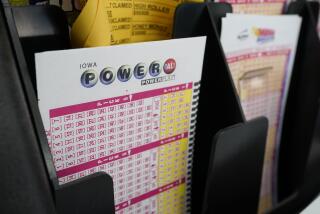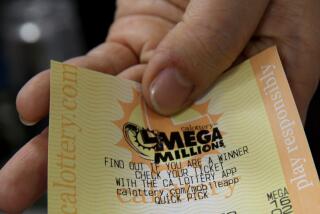Lottery Ticket Supplier to Win Biggest Jackpot of All
The big winner in California’s lottery will be known within a few weeks, perhaps as early as Friday.
The fortunate winner won’t be a lottery ticket buyer. It will be the ticket supplier.
The company that submits the winning bid to supply the state with its first year’s worth of instant “scratch-off” tickets will have struck gold in California’s lottery vein.
The contract could be worth $40 million to $50 million the first year the lottery operates and would more than double the annual gross sales of even the largest instant-ticket supplier in the country.
$2-Million-Plus Gamble
The high roller among suppliers is Scientific Games Inc. of Atlanta which, by bankrolling the successful pro-lottery initiative campaign last year, has made a $2 million-plus gamble that it will hit the instant ticket jackpot in California.
Bids to supply the state with its first year’s supply of up to 1.9 billion tickets are due in Sacramento by 2 p.m. Friday, and state Lottery Commission Chairman Howard Varner said Wednesday that Scientific Games already has submitted its bid.
Along with the bids, potential suppliers must provide to the state detailed financial disclosure data, as required by the initiative. That requirement may discourage Scientific Games’ competitors from bidding, although Varner added Wednesday that “I frankly think we might have two bids.”
Barring any other bidders, Scientific Games will almost certainly be awarded the contract by the state Lottery Commission on June 3. Tickets are expected to go on sale in the fall.
The bidding process is the culmination of a campaign that began more than a year ago.
On Jan. 17, 1984, San Francisco attorney Barry Fadem registered an organization called Californians for Better Education with the secretary of state’s office in Sacramento. Fadem listed himself as treasurer, his office manager as secretary and a law partner as chief executive officer of the organization.
Californians for Better Education was created as the proponent of what was to become Proposition 37, the state lottery initiative written by Fadem. The initiative stipulated that at least 34% of gross sales from the state lottery go to public education.
It was not Fadem’s first experience with a lottery initiative. In 1980, he played what he terms a minor role in an unsuccessful effort to establish a California lottery that listed cancer research as the beneficiary. The campaign was billed as the War on Cancer, Fadem recalled. During his work on that initiative effort, Fadem met John Koza, a founder, chairman and chief executive officer of Scientific Games.
During the same month in 1984 that Fadem formed Californians for Better Education, he said, he began representing Scientific Games as one of several attorneys working for the firm.
In the campaign for the 1984 lottery initiative, Californians for Better Education collected $2.4 million in donations, according to state records. Scientific Games contributed $2.1 million of it.
Never Opened Office
Californians for Better Education never opened an office. Instead, the organization used the address of Woodward & McDowell, a Burlingame political consulting firm that handled the lottery initiative campaign.
Jack McDowell of Woodward & McDowell served as news director for Californians for Better Education in 1984. In February, 1985, three months after passage of the lottery initiative, McDowell’s firm began working directly for Scientific Games as a political consultant.
This month, McDowell could not remember the names of any members of Californians for Better Education other than Fadem. McDowell suggested that Fadem be asked for the names of other members.
Fadem could remember the names of only two others.
“That . . . question,” he said, “I would have McDowell answer.”
Last November, state voters passed Proposition 37 by a 58% margin. Before and after passage, the initiative has been criticized as crafted to give Scientific Games the advantage in bidding for the ticket contract.
A major complaint against the Fadem-written lottery initiatives that were adopted in California and Oregon last year is a clause that requires that supplier bids be accompanied by detailed financial disclosures from not only suppliers, but from officers and major stockholders of parent companies.
Critics argue that the requirement gives Scientific Games an advantage because its parent company, Bally Manufacturing Corp. of Chicago, already has disclosed such information in New Jersey to obtain a casino license.
Officials of other large companies have maintained that the financial disclosure requirements are cumbersome, an invasion of privacy and, in the end, pointless.
“We would not be able to bid if the law (requiring detailed disclosures) continues as it is,” complained Duane Kaisand, vice president of Webcraft Games Inc. of North Brunswick, N.J., an instant-ticket supplier owned by the giant conglomerate, Beatrice Companies Inc.
Kaisand maintained that the disclosure clause would require more than 100 officers and directors of Beatrice Companies to produce detailed financial records, including copies of the last three years of personal federal income tax returns.
Beatrice Balks
Officers of Webcraft, itself, he said, are willing to supply the data, but the parent company is not.
“It has nothing to do with what we’re trying to withhold,” he said. “It’s that we cannot comply. We have made every effort to comply in the past and have run into the same stumbling block . . . that (Beatrice) believes it is a private matter.”
Even if the financial information were provided, it would be useless to authorities, Kaisand argued.
“It does not show anything on the income tax,” he said, “that would allow anyone to gain any information about a negative matter on their . . . background.
“Every one of them (Beatrice officials) have agreed in the past to allow a personal background check and a criminal background check.”
A bill to ease the disclosure requirement is moving through the California Legislature, but Assembly Republicans have vowed to block the measure because of a Democrat-backed provision requiring 30% of all large contracts to be subcontracted out to minority- and women-run firms.
Oregon lottery officials agree that the financial disclosure data required by that state’s initiative has provided virtually no information of value to the state in screening bidders.
Won Oregon Contract
Scientific Games was the only ticket supplier to meet the financial disclosure requirements in Oregon last January and was awarded a contract worth an estimated $4.3 million to supply the state with instant tickets during the first year of sales.
As in California, legislation is pending in Oregon to loosen the disclosure requirements in an effort to increase competitive bids for future lottery contracts.
Still, Oregon lottery officials say that Scientific Games would have been awarded the instant ticket contract even if its competitors also had met the disclosure requirements. Scientific Games was rated the best-qualified bidder by SRI, the Menlo Park-based consulting firm that evaluated bids for the state.
Indeed, despite such recurrent controversies, Scientific Games seems to enjoy a good reputation among state lottery officials.
‘First-Class Organization’
“I think they’ve been a first-class organization to work with,” said Charles E. Buri, executive director of the state lottery in Arizona, where Scientific Games has supplied most of the state’s instant tickets since the lottery began there in 1981.
Scientific Games, the largest supplier of instant lottery tickets in the country, did a total of $36 million in such sales to more than a dozen states last year, according to chairman Koza.
The company has also branched out into computerized on-line lottery equipment for games such as Lotto. California lottery officials expect to go into on-line games sometime next year, and Koza plans to compete for that multimillion-dollar contract.
Scientific Games has been controversial not only for its aggressive role in establishing and then contracting with state lotteries, but also because of its parent company, Bally Manufacturing.
Owns Magic Mountain
Bally, which owns such diverse enterprises as Magic Mountain and Jack LaLanne Fitness Centers, was required in 1979 to sever all ties with its founder and president, William O’Donnell Sr., in order to obtain the New Jersey casino license.
Although O’Donnell was never convicted of a crime, New Jersey gaming officials were concerned by allegations that he was an associate of organized crime figures, that O’Donnell was accused in an attempted bribery case and that he was alleged to be a high-stakes gambler on football games.
Koza insisted all that is in the past.
He also maintained that Scientific Games is in favor of changing the controversial financial disclosure requirements in California, but he scoffed at his competitors’ reluctance to meet them.
“It’s their corporate decision,” he said, “as to whether their companies want to stand in the . . . spotlight of the law enforcement people that would get the disclosures.
“We’re talking about a multimillion-dollar state contract. If they want to view it as an imposition on them to subject themselves to disclosure, that’s their corporate decision.”
Koza added that attorney Fadem patterned the disclosure requirements in the California and Oregon initiatives after Colorado legislation that was intended to make it tough for Scientific Games to get a contract in that state.
Strict Rules Supported
Colorado state Rep. Jerry Kopel confirmed that he strongly supported strict financial disclosure regulations for lottery bidders but was unaware that Scientific Games’ parent firm, Bally, could easily meet the requirements.
The law he supported, Kopel said ruefully, “has effectively kept competition out of Colorado.”
In Colorado, as in Oregon--and as may be the case in California--Scientific Games was the only bidder for the instant ticket contract.
More to Read
Inside the business of entertainment
The Wide Shot brings you news, analysis and insights on everything from streaming wars to production — and what it all means for the future.
You may occasionally receive promotional content from the Los Angeles Times.










